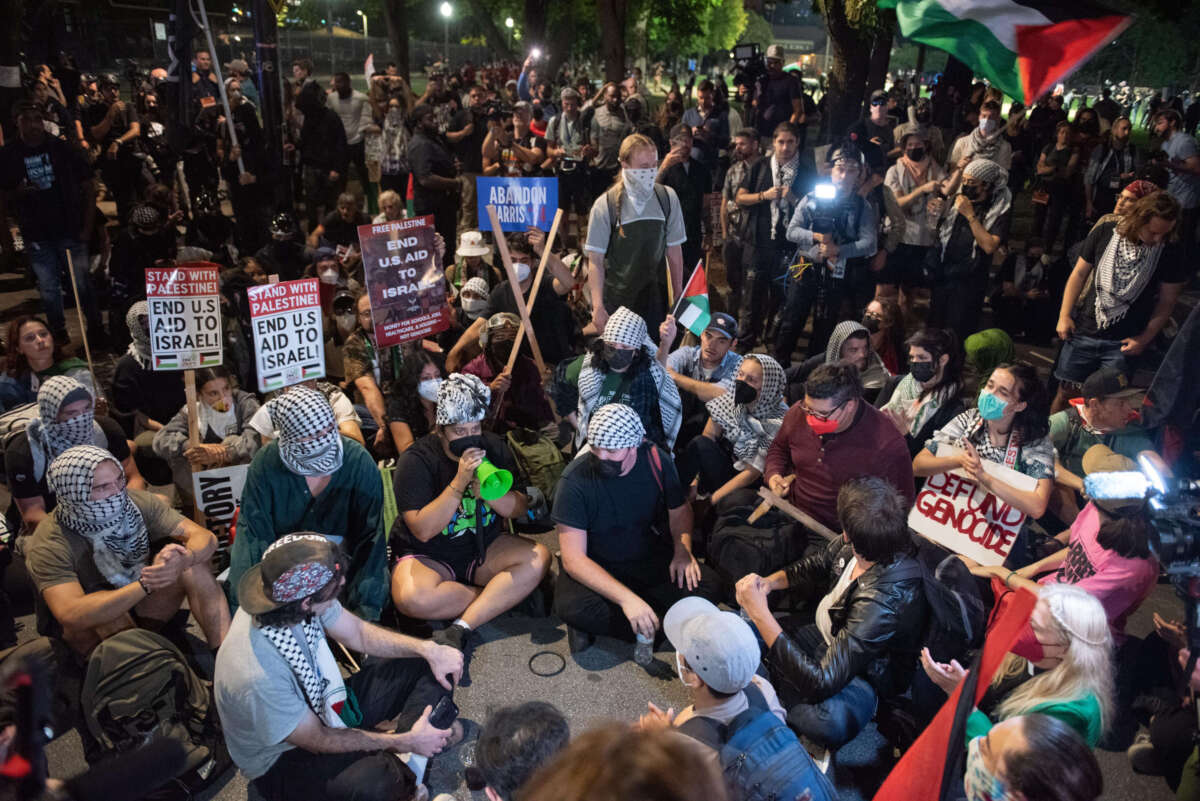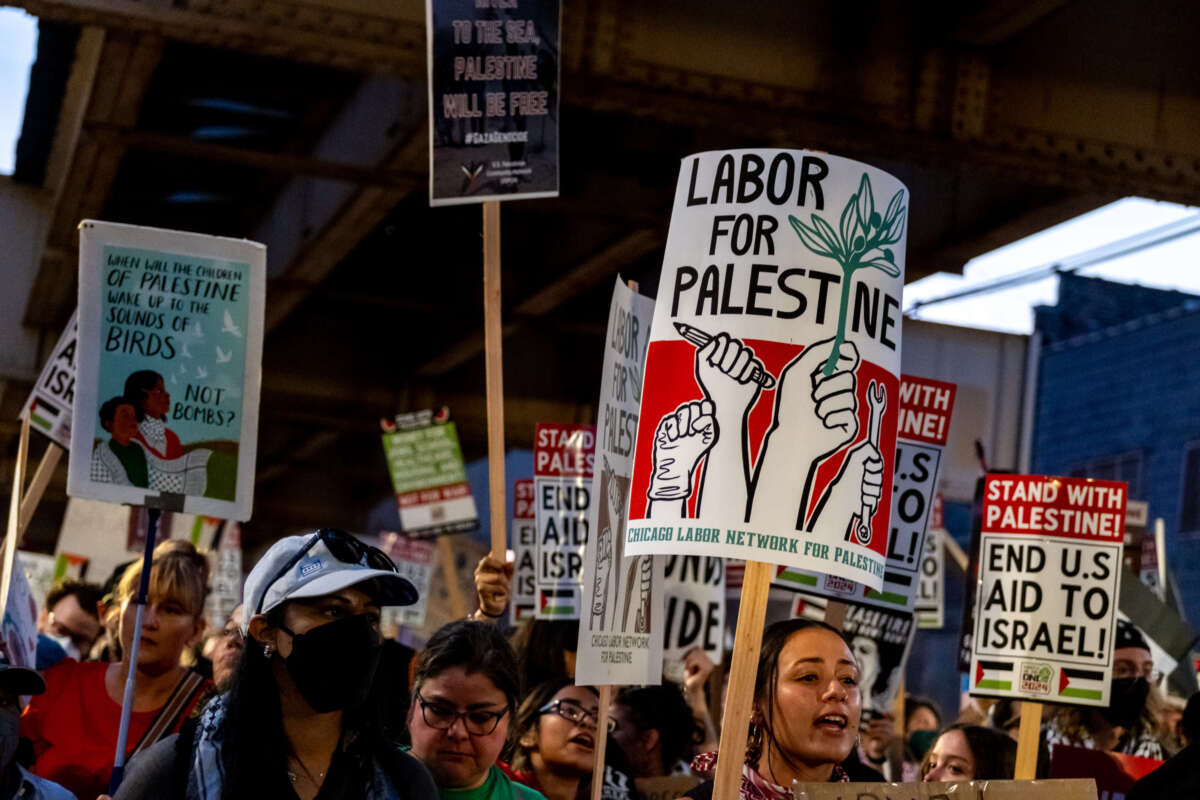Part of the Series
Struggle and Solidarity: Writing Toward Palestinian Liberation
As Vice President Kamala Harris officially received the presidential nomination Thursday evening, thousands of people marched within sight of the Democratic National Convention (DNC) demanding an embargo on U.S. arms shipments to Israel and an end to the war on Gaza.
Democrats wanted the protests — and any conversation about Palestine in general — kept on the sidelines of their convention as much as possible. But history will remember that the streets of Chicago were full of people demanding an end to genocide and occupation in Palestine as Harris took the stage.
Led in part by Palestinian and Jewish activists, the march was a mixture of joy, anger, grief and frustration that capped off a week of protests across downtown Chicago. Despite handwringing about security, the protests remained largely peaceful as an estimated 30,000 demonstrators took the streets over the course of the week.
Like previous protests, Thursday’s mass march was surrounded by hundreds of police on foot and bicycle at all times. Demonstrators from across the country declared Harris and President Joe Biden complicit with genocide in Gaza, where Israel’s 10-month siege and assault has killed at least 40,000 people, and left two-thirds of the enclave’s buildings damaged or destroyed.
Some protesters were seasoned activists from the various movements that have found lines of solidarity with Palestine, including anti-war veterans, climate justice activists, and labor organizers. Others were simply horrified by the tremendous suffering in Gaza — and the Democratic Party’s silence on the issue after continuously arming Israel with weapons despite allegations of war crimes and forced starvation on the international stage.
Many marchers came from communities and movements that Democrats often consider as solidly in their coalition. After months of watching Israel’s brutal assault, they warned that their votes could not be taken for granted.
“Our votes are no longer free or a given just for the sake that we are Democrats,” said Inan, a Palestinian woman from the Chicago area marching with fellow feminists and antiwar activists. “[Harris] has to earn our votes by ending genocide today, tonight.”
Cesar, a Chicago resident, brought his two adolescent children to the march.
“Just seeing the images of the mutilated children in Palestine just makes me think of my own kids, and it’s just not acceptable,” he told Truthout.
Asked whether he was disappointed in how the Democrats handled the Palestine issue during the convention, he said “absolutely.”
Nadiah Alyafai, a member of the U.S. Palestinian Community Network, one of more than 200 groups behind the march, said the estimated 30,000 people who protested the DNC over the past week made Palestine impossible to ignore.
“The DNC would have loved to just talk about Trump and how great of a president Biden is, but guess what: all of the media couldn’t stop talking about the genocide on Palestine this week because of our organizing,” Alyafai said in a statement.
Wilmur, who lives in the Chicago suburbs, is the son of Pakistani immigrants. He said his religious faith inspired him to come downtown and join the march.
“So many people are dying unjustly, and the Quran states that we have to fight for our Muslim brothers and sisters,” he said in an interview. “That’s why as a Pakistani, Indian, whoever you are, as a human, you should come here, you should support whatever is happening here.”
The protests at the DNC brought together several coalitions, including organizers for reproductive freedom and racial justice. Chicago activists are in a decades-long struggle to hold the Chicago Police Department accountable for racist violence and corruption. As Rep. Cori Bush (D-Missouri) pointed out in a video call updating Palestine advocates inside the convention hall, Palestinians showed up for Black people during the uprisings for racial justice in 2020.
In Chicago, a city largely run by Democrats, activists said the movements for Black and Palestinian liberation are challenging the same militarized machinations of state violence. Chicago is also home to the largest Palestinian population in the United States.
Jasmine Smith, an organizer with the Chicago Alliance Against Racist and Political Repression who works with survivors of police violence and torture, said Democrats have Black and Palestinian blood on their hands after failing to stop both the war on Gaza and the over-policing of Black communities at home.
“My people ask me, ‘How does the war on Gaza have anything to do with us?’” Smith told rallygoers in a speech. “Well, let me say it loud and clear: The same government is still funding the war against us and our Black communities until this day.”
The distrust between cops and the Chicago activist community was palpable at the protests. The presence of police from the city and its surrounding areas was unavoidable: hundreds of riot police surrounded the march at all times. Protesters repeated chants urging them to go home.
There was a feeling of disconnect with the Democratic convention itself inside the United Center, which loomed off to the side of the march route, beyond a public park and behind heavily guarded security fencing. Organizers spent weeks fighting in court for a permit that would allow them to march within “sight and sound” of the convention at all.
As protesters marched past the convention, an unbroken line of police on bicycles stood as a further barrier between the demonstration and the convention hall where Harris was preparing to take the stage.
As the march returned to Union Park, back where it began, long lines of riot police slowly hemmed in the crowd. Fatigued, one protester decided to sit down in the middle of the street while waiting for the crowd to move. Then another protester joined in and sat down, and another, and another. Soon a crowd of people was sitting down on the road, determined to hold a presence there until the convention ended.

The police looked on warily and surrounded the crowd but stood by as songs and chants continued into the summer night.
“I was thinking a lot about what photos and moments will make the history books from these past weeks,” Arielle Rebekah, a spokesperson for the Chicago chapter of Jewish Voice for Peace, told Truthout in a text message.
“I suspect the juxtaposition of Kamala speaking versus us in the streets could be one of them.”
Trump is busy getting ready for Day One of his presidency – but so is Truthout.
Trump has made it no secret that he is planning a demolition-style attack on both specific communities and democracy as a whole, beginning on his first day in office. With over 25 executive orders and directives queued up for January 20, he’s promised to “launch the largest deportation program in American history,” roll back anti-discrimination protections for transgender students, and implement a “drill, drill, drill” approach to ramp up oil and gas extraction.
Organizations like Truthout are also being threatened by legislation like HR 9495, the “nonprofit killer bill” that would allow the Treasury Secretary to declare any nonprofit a “terrorist-supporting organization” and strip its tax-exempt status without due process. Progressive media like Truthout that has courageously focused on reporting on Israel’s genocide in Gaza are in the bill’s crosshairs.
As journalists, we have a responsibility to look at hard realities and communicate them to you. We hope that you, like us, can use this information to prepare for what’s to come.
And if you feel uncertain about what to do in the face of a second Trump administration, we invite you to be an indispensable part of Truthout’s preparations.
In addition to covering the widespread onslaught of draconian policy, we’re shoring up our resources for what might come next for progressive media: bad-faith lawsuits from far-right ghouls, legislation that seeks to strip us of our ability to receive tax-deductible donations, and further throttling of our reach on social media platforms owned by Trump’s sycophants.
We’re preparing right now for Trump’s Day One: building a brave coalition of movement media; reaching out to the activists, academics, and thinkers we trust to shine a light on the inner workings of authoritarianism; and planning to use journalism as a tool to equip movements to protect the people, lands, and principles most vulnerable to Trump’s destruction.
We urgently need your help to prepare. As you know, our December fundraiser is our most important of the year and will determine the scale of work we’ll be able to do in 2025. We’ve set two goals: to raise $150,000 in one-time donations and to add 1,500 new monthly donors.
Today, we’re asking all of our readers to start a monthly donation or make a one-time donation – as a commitment to stand with us on day one of Trump’s presidency, and every day after that, as we produce journalism that combats authoritarianism, censorship, injustice, and misinformation. You’re an essential part of our future – please join the movement by making a tax-deductible donation today.
If you have the means to make a substantial gift, please dig deep during this critical time!
With gratitude and resolve,
Maya, Negin, Saima, and Ziggy
